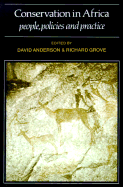Book contents
- Frontmatter
- Contents
- Preface
- List of contributors
- Introduction: The scramble for Eden: past, present and future in African conservation
- Part One Conservation ideologies in Africa
- Part Two Wildlife, Parks and Pastoralist
- Part Three Conservation priorities and rural communities
- Introduction
- 9 Local institutions, tenure and resource management in East Africa
- 10 Conflicting uses for forest resources in the Lower Tana River basin of Kenya
- 11 Environmental degradation, soil conservation and agricultural policies in Sierra Leone, 1895–1984
- 12 Managing the forest: the conservation history of Lembus, Kenya,1904–63
- Part Four Consequences for conservation and development
- Index
11 - Environmental degradation, soil conservation and agricultural policies in Sierra Leone, 1895–1984
Published online by Cambridge University Press: 04 April 2011
- Frontmatter
- Contents
- Preface
- List of contributors
- Introduction: The scramble for Eden: past, present and future in African conservation
- Part One Conservation ideologies in Africa
- Part Two Wildlife, Parks and Pastoralist
- Part Three Conservation priorities and rural communities
- Introduction
- 9 Local institutions, tenure and resource management in East Africa
- 10 Conflicting uses for forest resources in the Lower Tana River basin of Kenya
- 11 Environmental degradation, soil conservation and agricultural policies in Sierra Leone, 1895–1984
- 12 Managing the forest: the conservation history of Lembus, Kenya,1904–63
- Part Four Consequences for conservation and development
- Index
Summary
Awareness of the need to prevent environmental degradation and to institute soil conservation measures formed an important element in colonial forestry and agricultural policies throughout the African continent. Recent studies of colonial agricultural policies in East and southern Africa have noted that political considerations, as well as influences from outside the colonies, were significant factors in the implementation of soil conservation programmes, particularly in the colonies of white settlement (Berry & Townshend, 1971; Robinson, 1978, 1981; Stocking, 1983; Anderson, 1984; Beinart, 1984). However, it has not yet been demonstrated whether the generalisations drawn from these studies are applicable to the trade-orientated, West African colonies. This study analyses the relationship between agriculture and soil conservation policies, and environmental degradation during the past century in Sierra Leone (see Millington, 1987a). The period has been divided into thr2ee phases, the first beginning with the establishment of the Sierra Leone Protectorate in 1895, the second running from 1939 until independence in 1961, and the third dealing with the years since independence.
Environmental degradation, 1895–1939
The first detailed statements on environmental degradation in Sierra Leone during this period are to be found in the extensive forest surveys conducted in 1909 and 1911. These concentrated on water resources (Unwin, 1909) and soil degradation (Lane-Poole, 1911) respectively, but both concurred in attributing large-scale deforestation to ‘wasteful’ and ‘reckless’ shifting cultivation.
- Type
- Chapter
- Information
- Conservation in AfricaPeoples, Policies and Practice, pp. 229 - 248Publisher: Cambridge University PressPrint publication year: 1988



